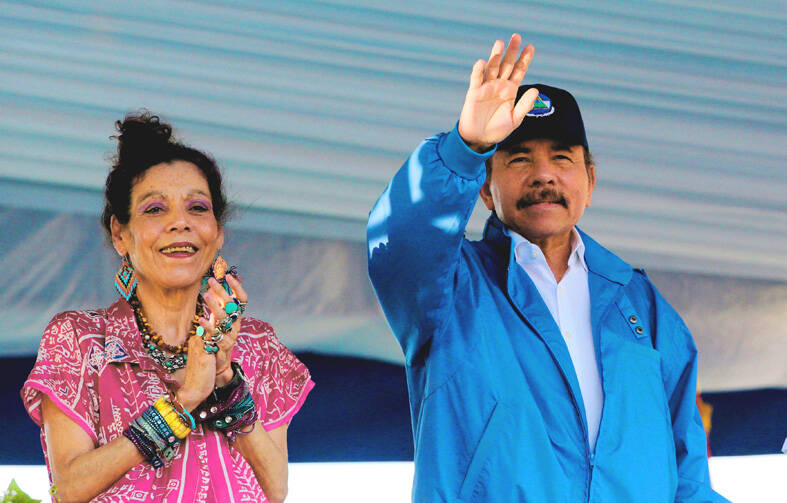The Nicaraguan parliament, dominated by the ruling Sandinista Front, on Friday approved a constitutional reform that hands more power to Nicaraguan President Daniel Ortega and his wife, Vice President Rosario Murillo, as well as the Central American nation’s police and military.
The reform increases the president’s control over the media, extends the presidential term to six years from five, and changes the roles of vice president and president to those of “co-presidents.”
Murillo would now become his co-president. The two have been married since 2005 and she was made vice president in 2017.

Photo: REUTERS
Ortega has cracked down on dissent over recent years. More than 200 political prisoners were freed early last year and expelled to the US, including five former presidential hopefuls who had been jailed after seeking to challenge the increasingly authoritarian Ortega in a 2021 election.
Under the new reform, the co-presidents would have control over the legislature, judiciary and electoral, public administration, and oversight bodies as well as autonomous entities.
It also mandates that the state would ensure media are not “subject to foreign interests and do not spread false news.”
The reform must pass a second legislative vote next year before becoming law.
Government critics have said the reforms legalize the “absolute power” already exercised for years by Ortega and Murillo.
The Organization of American States, a regional diplomatic body, has said that through the reform Ortega and Murillo intend to “increase their absolute control of the state and maintain their position in power.”
The reform, which 79-year-old Ortega sent to the Nicaraguan Congress on Tuesday “as a matter of urgency,” was approved unanimously by 91 lawmakers.
National Assembly of Nicaragua President Gustavo Porras, confirmed during Friday’s session that the reform would be voted on and approved for a second time on Jan. 10, following Nicaraguan law that says constitutional changes must be approved in two legislative periods.
Porras brushed off criticisms of the reform, calling them “a stupid way of carrying out opposition.”
Dora Maria Tellez, a former Sandinista guerrilla expelled to the US after being jailed in 2021, said that besides giving “constitutional status to everything that the dictatorship has been doing de facto,” the reform was paving the way for Ortega’s succession.
“The co-presidency gives Rosario Murillo total power in Nicaragua, which she will end up assuming when Daniel Ortega is gone,” Tellez said, adding that the co-presidents’ ability to appoint vice presidents “clears the way for the children of the ruling couple to be constitutionally placed in the line of succession.”
UN High Commissioner for Human Rights Volker Turk in a statement said the changes marked a concerning further erosion of checks and balances on executive power.
“If adopted, these changes will sound the death knell for fundamental freedoms and rule of law in Nicaragua,” he said.

POLITICAL PRISONERS VS DEPORTEES: Venezuela’s prosecutor’s office slammed the call by El Salvador’s leader, accusing him of crimes against humanity Salvadoran President Nayib Bukele on Sunday proposed carrying out a prisoner swap with Venezuela, suggesting he would exchange Venezuelan deportees from the US his government has kept imprisoned for what he called “political prisoners” in Venezuela. In a post on X, directed at Venezuelan President Nicolas Maduro, Bukele listed off a number of family members of high-level opposition figures in Venezuela, journalists and activists detained during the South American government’s electoral crackdown last year. “The only reason they are imprisoned is for having opposed you and your electoral fraud,” he wrote to Maduro. “However, I want to propose a humanitarian agreement that

ECONOMIC WORRIES: The ruling PAP faces voters amid concerns that the city-state faces the possibility of a recession and job losses amid Washington’s tariffs Singapore yesterday finalized contestants for its general election on Saturday next week, with the ruling People’s Action Party (PAP) fielding 32 new candidates in the biggest refresh of the party that has ruled the city-state since independence in 1965. The move follows a pledge by Singaporean Prime Minister Lawrence Wong (黃循財), who took office last year and assumed the PAP leadership, to “bring in new blood, new ideas and new energy” to steer the country of 6 million people. His latest shake-up beats that of predecessors Lee Hsien Loong (李顯龍) and Goh Chok Tong (吳作棟), who replaced 24 and 11 politicians respectively

Young women standing idly around a park in Tokyo’s west suggest that a giant statue of Godzilla is not the only attraction for a record number of foreign tourists. Their faces lit by the cold glow of their phones, the women lining Okubo Park are evidence that sex tourism has developed as a dark flipside to the bustling Kabukicho nightlife district. Increasing numbers of foreign men are flocking to the area after seeing videos on social media. One of the women said that the area near Kabukicho, where Godzilla rumbles and belches smoke atop a cinema, has become a “real

‘WATER WARFARE’: A Pakistani official called India’s suspension of a 65-year-old treaty on the sharing of waters from the Indus River ‘a cowardly, illegal move’ Pakistan yesterday canceled visas for Indian nationals, closed its airspace for all Indian-owned or operated airlines, and suspended all trade with India, including to and from any third country. The retaliatory measures follow India’s decision to suspend visas for Pakistani nationals in the aftermath of a deadly attack by shooters in Kashmir that killed 26 people, mostly tourists. The rare attack on civilians shocked and outraged India and prompted calls for action against their country’s archenemy, Pakistan. New Delhi did not publicly produce evidence connecting the attack to its neighbor, but said it had “cross-border” links to Pakistan. Pakistan denied any connection to